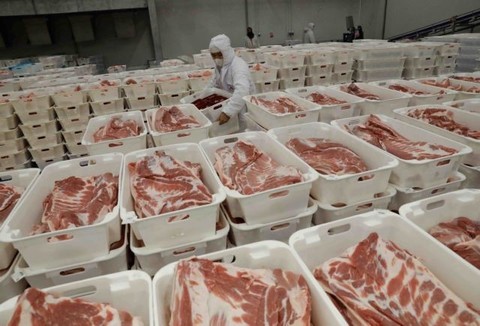
Pork of Masan MEATLife JSC's factory located in Đồng Văn IV Industrial Park, Hà Nam Province. The livestock sector needs to increase pork supply for Tết. — VNA/VNS Photo
The livestock industry needs to ensure pork supply increases by 10-15 per cent for the Tết Holiday to avoid price fluctuations.
Speaking at a conference on promoting sustainable pig farming development held by the Ministry of Agriculture and Rural Development (MARD) on Wednesday, Deputy Minister Phùng Đức Tiến made the request because pork plays a very important role in stabilising food prices. If the supply is ensured, the CPI will be stabilised.
According to the Department of Livestock, MARD, the total number of pigs nationwide is about 25.5 million, an increase of 2.9 per cent over the same period in 2023.
Việt Nam has become the country with the fifth largest pig farming industry in terms of headcount and sixth in terms of output in the world.
The total numbers of pigs, poultry and cattle in the country continues to increase and livestock diseases have been gradually pushed back, ensuring the growth of the industry.
At the conference, participants said that it is necessary to have more mechanisms to promote biosafety livestock and ensure disease safety and offer synchronous solutions for breeding animals, animal feed, livestock environment and animal feed ingredients.
Nguyễn Xuân Dương, Chairman of the Việt Nam Livestock Association and Lê Thanh Hòa, Deputy Director of the Department of Quality - Processing and Market Development, MARD agreed that sustainable development of pig farming needs joined up solutions. Sustainability is not only about stable supply and disease safety, but also the livelihoods of farmers.
According to representatives of associations and State management agencies, the biggest difficulty in pig farming is controlling disease.
In addition, Việt Nam's livestock industry currently can only meet the domestic demand and doesn't have a great capacity for export.
Meanwhile, Việt Nam also has advantages in animal feed production not only for livestock but also for the aquaculture industry.
If domestic raw materials are used well to reduce the cost of animal feed, it will increase the competitiveness of livestock products in the future.
In addition, it is also necessary to research more niche markets to increase exports, meaning more investment in processing animal products, such as sausages, smoked meat and heat-treated pork products. — VNS